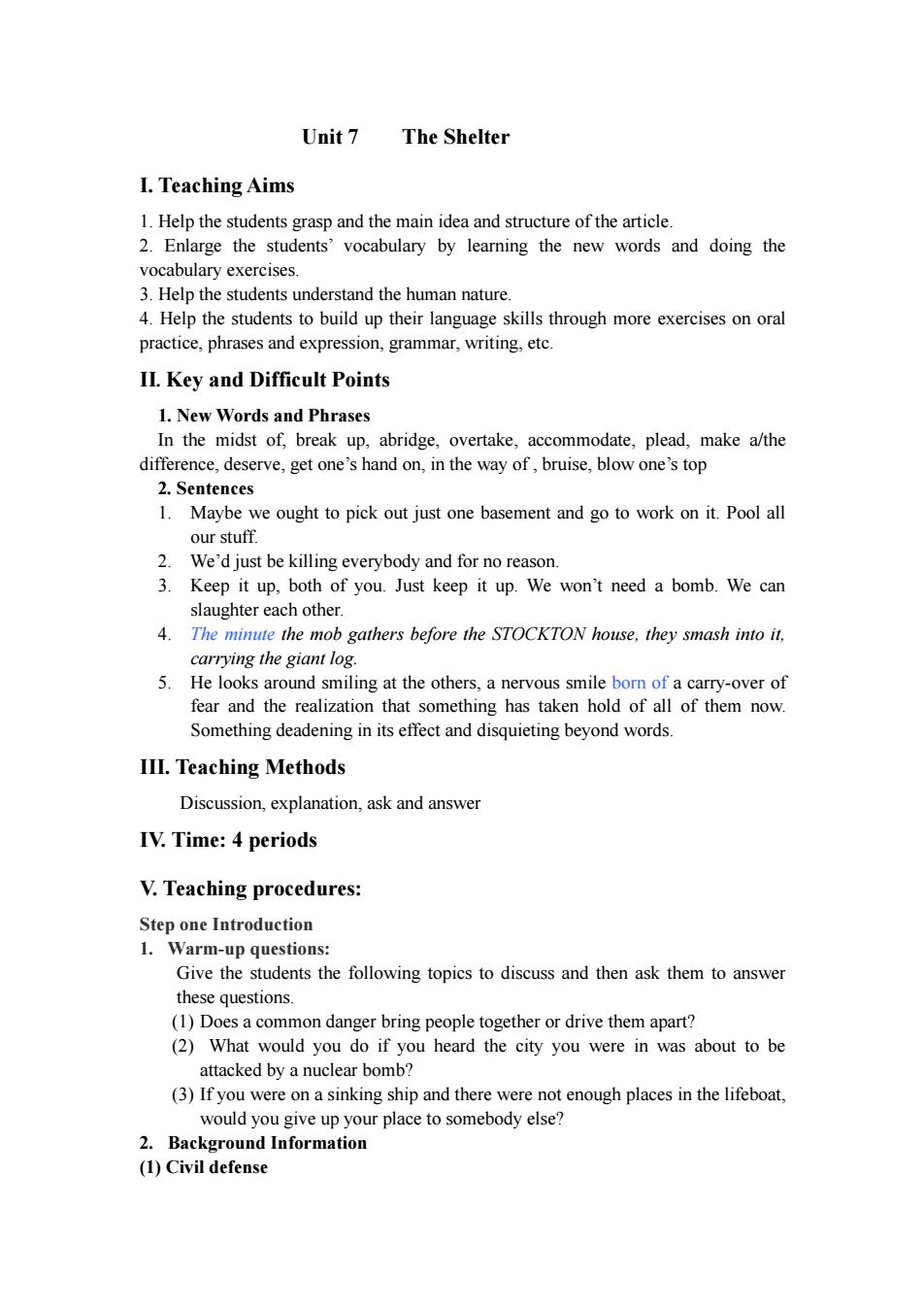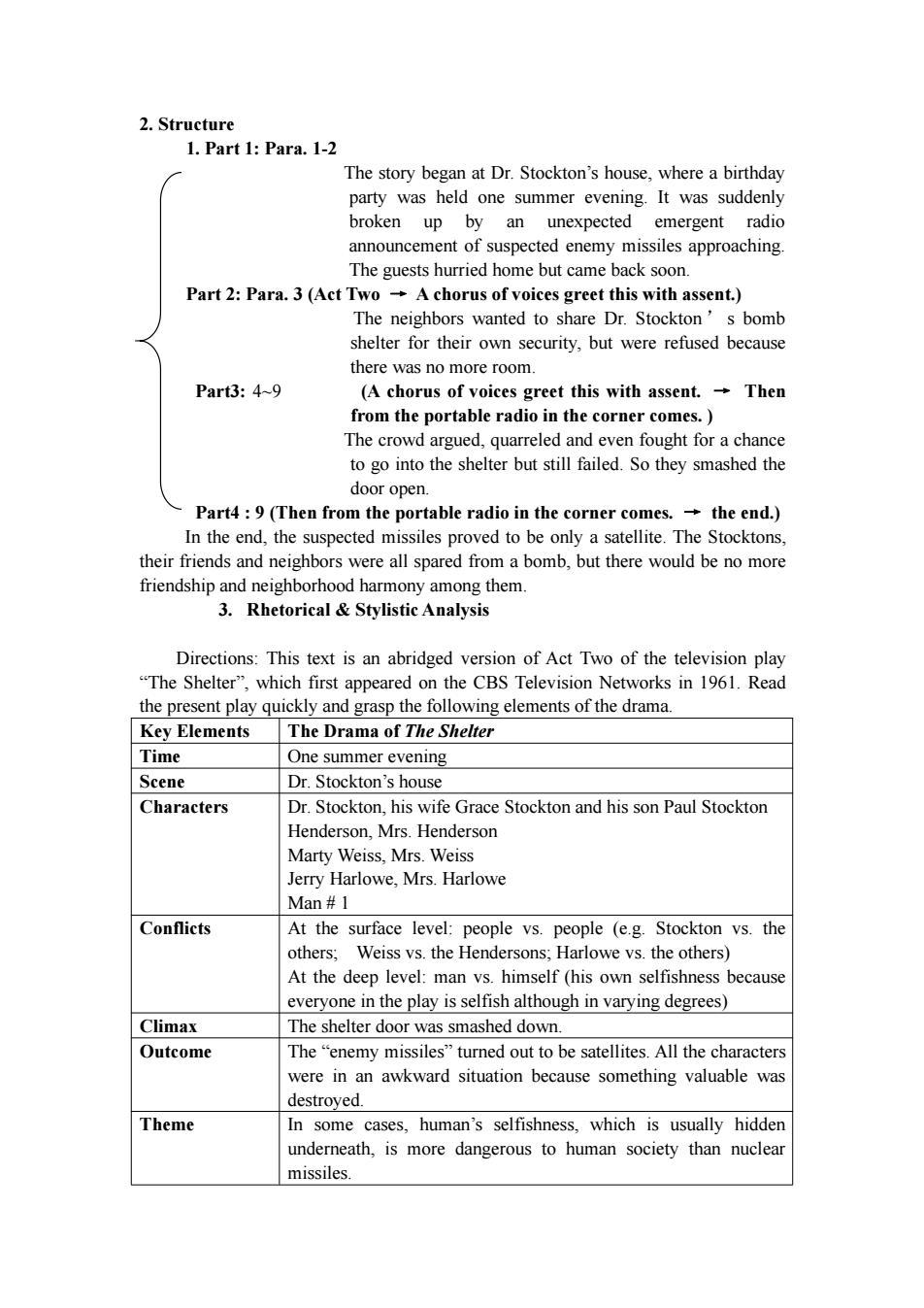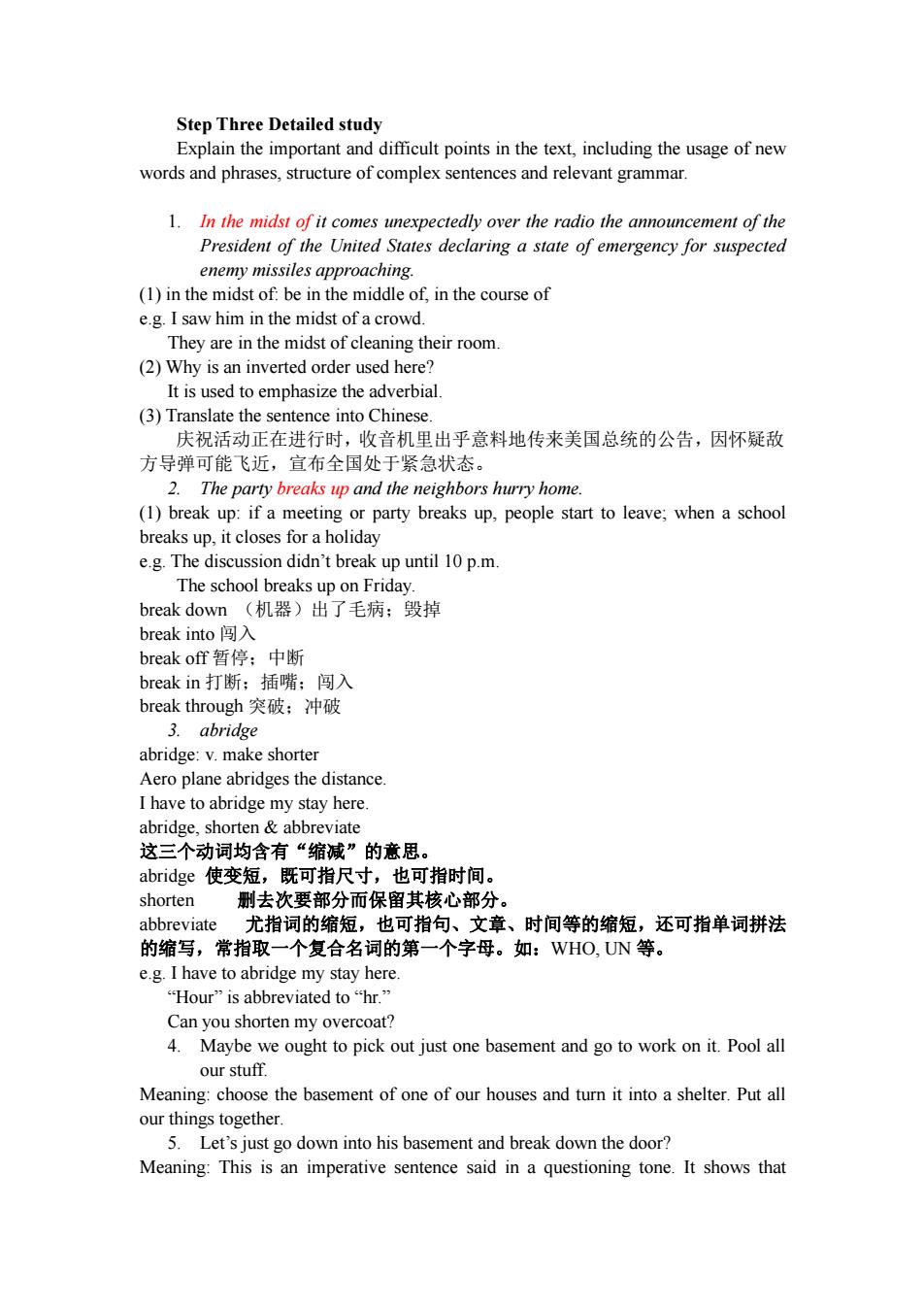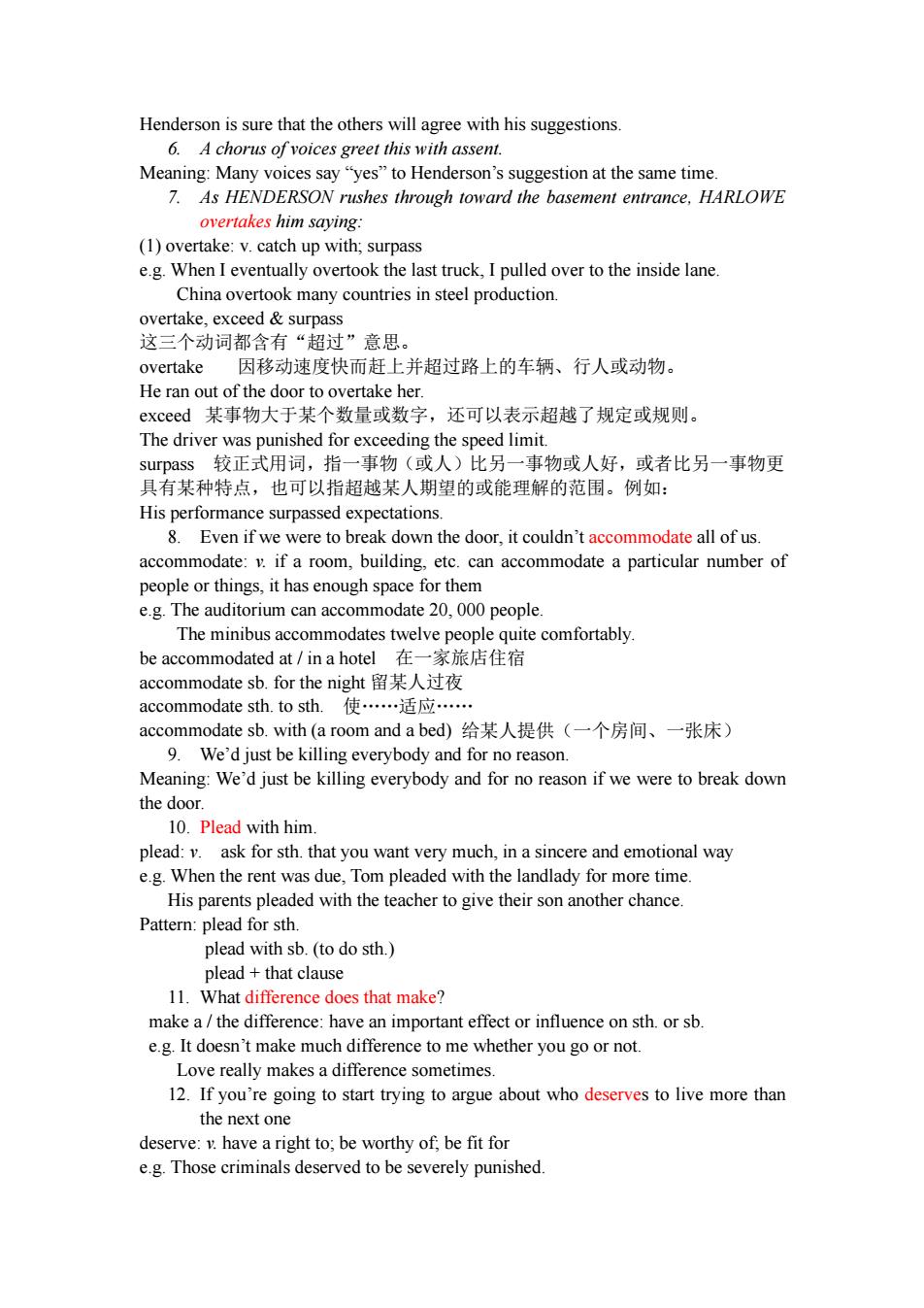
Unit 7 The Shelter I.Teaching Aims 1.Help the students grasp and the main idea and structure of the article. 2.Enlarge the students'vocabulary by learning the new words and doing the vocabulary exercises. 3.Help understandthe 4.Help t the students tobuild up their anguage skills throuh more practice,phrases and expression,grammar,writing,etc. II.Key and Difficult Points 1.New Words and Phrase In the midst of,break up.abridge.overtake,accommodate,plead,make a/the difference,deserve,get one's hand on,in the way of,bruise,blow one's top 2.Sentences 1.Maybe we ought to pick out just one basement and go to work on it.Pool all our stuff 2.We'd just be killing everybody and for no reasor 3 Keep it up,both of you.Just keep it up.We won't need a bomb.We can slaughter each other. 4.The minute the mob gathers before the STOCKTON house,they smash into it, carrying the giant log. 5.He looks a us smile born of a y-over of fear and the Something deadening in its effect and disquieting beyond words III.Teaching Methods Discussion,explanation,ask and answer IV.Time:4 periods V.Teaching procedures: Step one Introduction 1.Warm- p qu stions Give the students the following topics to discuss and then ask them to answer these questions (1)Does a common danger bring people together or drive them apart? (2)What would you do if you heard the city you were in was about to be attacked by a nuclear bomb? (3)fy0 were on a sinking ship and there were not enough places in the lifeboat. would you give up your place to somebody else? 2.Background Information (1)Civil defense
Unit 7 The Shelter I. Teaching Aims 1. Help the students grasp and the main idea and structure of the article. 2. Enlarge the students’ vocabulary by learning the new words and doing the vocabulary exercises. 3. Help the students understand the human nature. 4. Help the students to build up their language skills through more exercises on oral practice, phrases and expression, grammar, writing, etc. II. Key and Difficult Points 1. New Words and Phrases In the midst of, break up, abridge, overtake, accommodate, plead, make a/the difference, deserve, get one’s hand on, in the way of , bruise, blow one’s top 2. Sentences 1. Maybe we ought to pick out just one basement and go to work on it. Pool all our stuff. 2. We’d just be killing everybody and for no reason. 3. Keep it up, both of you. Just keep it up. We won’t need a bomb. We can slaughter each other. 4. The minute the mob gathers before the STOCKTON house, they smash into it, carrying the giant log. 5. He looks around smiling at the others, a nervous smile born of a carry-over of fear and the realization that something has taken hold of all of them now. Something deadening in its effect and disquieting beyond words. III. Teaching Methods Discussion, explanation, ask and answer IV. Time: 4 periods V. Teaching procedures: Step one Introduction 1. Warm-up questions: Give the students the following topics to discuss and then ask them to answer these questions. (1) Does a common danger bring people together or drive them apart? (2) What would you do if you heard the city you were in was about to be attacked by a nuclear bomb? (3) If you were on a sinking ship and there were not enough places in the lifeboat, would you give up your place to somebody else? 2. Background Information (1) Civil defense

Civil defense is the national program of the U.S.to safeguard civilian life and property.With the coming of the age of missiles and rockets,civil defense has become aprogram for national With the menace of missiles,people may be doomed by fallout(放射性尘埃) the dangerous radioactive particles or dust that is left in the air after a nuclear explosion.There is no practical way to protect people in the immediate range of a nuclear explosion.Civil defense,therefore,must be based primarily on a system of fallout shelt In 1961,the federal government of the U.S.began to survey to find shelter spaces in factories,office buildings,and other places.These shelters were to be stocked with essential supplies,marked for identification,and made available to the public in an emergency. (2)Missiles Air-to-air and air-to-surface guided missiles are generally short-range.light rocket-powered projectiles with sophisticated internal guidance systems.Both types were tested in wartime Germany,and the German radio-controlled glide bombs were responsible for sinking numerous Allied ships.Although these early missile weapons relied on optical tracking nd c ontrol from t ai uedsiependnthertarget-ngmechanid -ground 3.Introductory Remarks Drama is one of several methods of telling a story.It differs from the novel in that the story is not told directly by the author but is acted on a stage by actors before.Strictly speakingaprinted play isnotaplay ntil itisacted reding hearing the characters in action Most critics agree that the essence of drama is conflict.A conflict is a clash of actions,ideas,desires or wills.It may happen in different forms:man against man,man against environment or man against himself.The conflict becomes more and more intensified as the play m on until it reaches its climax,the point of the greatest tension. When the story is over,we are able to see wha it all amounts to what the playwright has been gradually disclosing throughout the play.Only then can we define and assess the theme,a kind of generalization about life embodied in the story. Step Two Global reading (1)Questions (1)What is going on at Dr.Stockton's one summer evening. (2)Why does Stockton refuse to share his bomb shelter with his neighbors? (3)What is Stockton's reason for refusing his neighbors to come into the shelter? (4)What do the neighbors intend to do when they gather before the Stockton (5)How do the Stocktons put resistance against their neighbors'intrusion? (6)What do the neighbors think of their own behavior once the crisis (7)What conclusions does Stockton draw from the events of the evening?
Civil defense is the national program of the U. S. to safeguard civilian life and property. With the coming of the age of missiles and rockets, civil defense has become a program for national survival. With the menace of missiles, people may be doomed by fallout (放射性尘埃) — the dangerous radioactive particles or dust that is left in the air after a nuclear explosion. There is no practical way to protect people in the immediate range of a nuclear explosion. Civil defense, therefore, must be based primarily on a system of fallout shelters. In 1961, the federal government of the U. S. began to survey to find shelter spaces in factories, office buildings, and other places. These shelters were to be stocked with essential supplies, marked for identification, and made available to the public in an emergency. (2) Missiles Air-to-air and air-to-surface guided missiles are generally short-range, light, rocket-powered projectiles with sophisticated internal guidance systems. Both types were tested in wartime Germany, and the German radio-controlled glide bombs were responsible for sinking numerous Allied ships. Although these early missile weapons relied on optical tracking and control from parent aircraft, most current air-to-ground guided missiles depend on their own target-sensing mechanism once launched. 3. Introductory Remarks Drama is one of several methods of telling a story. It differs from the novel in that the story is not told directly by the author but is acted on a stage by actors before an audience. Strictly speaking, a printed play is not a play until it is acted. So, when reading plays, we must imagine seeing and hearing the characters in action.Most critics agree that the essence of drama is conflict. A conflict is a clash of actions, ideas, desires or wills. It may happen in different forms: man against man, man against environment or man against himself. The conflict becomes more and more intensified as the play moves on until it reaches its climax, the point of the greatest excitement or tension. When the story is over, we are able to see what it all amounts to what the playwright has been gradually disclosing throughout the play. Only then can we define and assess the theme, a kind of generalization about life embodied in the story. Step Two Global reading (1) Questions (1) What is going on at Dr. Stockton’s one summer evening? (2) Why does Stockton refuse to share his bomb shelter with his neighbors? (3) What is Stockton’s reason for refusing his neighbors to come into the shelter? (4) What do the neighbors intend to do when they gather before the Stockton house with a giant log? (5) How do the Stocktons put resistance against their neighbors’ intrusion? (6) What do the neighbors think of their own behavior once the crisis (7) What conclusions does Stockton draw from the events of the evening?

2.Structure 1.Part 1:Para.1-2 The story began at Dr.Stockton's house,where a birthday party was held one summer evening.It was suddenly broken up by an unexpected emergent radio announcement of suspected enemy missiles approaching. The guests hurried home but came back soon. Part 2:Para.3(Act Two greet this with assent.) Stockt s bomb shelter for their own security,but were refused because there was no more room. Part3:4-9 (A chorus of voices greet this with assent.-Then from the portable radio in the corner comes.) The crowd argued,quarrele d even fought for a chance to go into the shelter but still failed.So they smashed the door open. Part4:9(Then from the portable radio in the corner comes.the end.) In the end,the suspected missiles proved to be only a satellite.The Stockton their friends and neighb were all spared from a bomb,but there would be no more friendship and neighborhood harmony among them 3.Rhetorical Stvlistic Analvsis Ddirections:This text is an abridged version of act Two of the television plav "The Shelter' which first on the CBS Television ks in 1961.Reac the present play qu ving elements of the drama Key Elements The Drama of The Shelter Time One summer evening Scene Dr.Stockton's house Characters Dr.Stockton,his wife Grace Stockton and his son Paul Stockton Henderson,Mrs.Henderson Marty Weiss Mrs Weiss Jerry Harlowe,Mrs.Harlowe Man 1 At the rface level:people vs.people (e.g.Stockton vs.the others;Weiss vs.the Hendersons;Harlowe vs.the others) At the deep level:man ys.himself (his own selfishness because everyone in the play is selfish although in varying degrees) Climax The shelter door was smashed dowr Outcome The"enemy missiles"turned out to be satellites.All the characters were in an awkward situation because something valuable was destroyed. Theme In some cases,human's selfishness,which is usually hidden ndern ath, is more dangerous to human society than nuclea missiles
2. Structure 1. Part 1: Para. 1-2 The story began at Dr. Stockton’s house, where a birthday party was held one summer evening. It was suddenly broken up by an unexpected emergent radio announcement of suspected enemy missiles approaching. The guests hurried home but came back soon. Part 2: Para. 3 (Act Two → A chorus of voices greet this with assent.) The neighbors wanted to share Dr. Stockton ’ s bomb shelter for their own security, but were refused because there was no more room. Part3: 4~9 (A chorus of voices greet this with assent. → Then from the portable radio in the corner comes. ) The crowd argued, quarreled and even fought for a chance to go into the shelter but still failed. So they smashed the door open. Part4 : 9 (Then from the portable radio in the corner comes. → the end.) In the end, the suspected missiles proved to be only a satellite. The Stocktons, their friends and neighbors were all spared from a bomb, but there would be no more friendship and neighborhood harmony among them. 3. Rhetorical & Stylistic Analysis Directions: This text is an abridged version of Act Two of the television play “The Shelter”, which first appeared on the CBS Television Networks in 1961. Read the present play quickly and grasp the following elements of the drama. Key Elements The Drama of The Shelter Time One summer evening Scene Dr. Stockton’s house Characters Dr. Stockton, his wife Grace Stockton and his son Paul Stockton Henderson, Mrs. Henderson Marty Weiss, Mrs. Weiss Jerry Harlowe, Mrs. Harlowe Man # 1 Conflicts At the surface level: people vs. people (e.g. Stockton vs. the others; Weiss vs. the Hendersons; Harlowe vs. the others) At the deep level: man vs. himself (his own selfishness because everyone in the play is selfish although in varying degrees) Climax The shelter door was smashed down. Outcome The “enemy missiles” turned out to be satellites. All the characters were in an awkward situation because something valuable was destroyed. Theme In some cases, human’s selfishness, which is usually hidden underneath, is more dangerous to human society than nuclear missiles

Step Three Detailed study Explain the important and difficult points in the text,including the usage of new words and phrases,structure of complex sentences and relevant gramma 1.In the midst of it comes unexpectedly over the radio the announcement of the President of the United States declaring a state of emergency for suspected enemy missiles approaching. (1in the midst of be in the middle of,in the course of e.g.I saw him in the midst of a crowd. They are in the midst of cleaning their room. (2)Why is an inverted order used here? It is used to emphasize the adverbial (3)Translate the into Chin 庆祝活动正在进行 收音机里出乎意料地传来美国总统的公告,因怀疑敌 方导弹可能飞近,宜布全国处于紧急状态。 2.The party breaks up and the neighbors hurry home. (1)break up:if a meeting or party breaks up,people start to leave:when a school up,it closes for a holiday discussion didn't break upuntil 10pm. The school breaks up on Friday. break down(机器)出了毛病:毁掉 break into闯入 break off暂停:中断 break in打断插嘴: 入 break through突破:冲破 3.abridge abridge:v.make shorter Aero plane abridges the distance I have to abridge my stay here 这三个动词均含有“缩减”的意思。 abridge使变短,既可指尺寸,也可指时间。 shorten 删去次要部分而保留其核心部分 abbreviate 尤指词的缩短,也可指句、文章、时间等的缩短,还可指单词拼法 的缩写,常指取 个复合名词的第 个字母。如:WHO,UN等 e.g.I have to abridge my stay here. “Hour”is abbreviated to“hr Can you shorten my overcoat? 4.Maybe we ought to pick out just one basement and go to work on it.Pool all our stuff. Meaning:choose the basement of one of our houses and turn it into a shelter.Put all our things together. 5.Let's just go down into his basement and break down the door? Meaning:This is an imperative sentence said in a questioning tone.It shows that
Step Three Detailed study Explain the important and difficult points in the text, including the usage of new words and phrases, structure of complex sentences and relevant grammar. 1. In the midst of it comes unexpectedly over the radio the announcement of the President of the United States declaring a state of emergency for suspected enemy missiles approaching. (1) in the midst of: be in the middle of, in the course of e.g. I saw him in the midst of a crowd. They are in the midst of cleaning their room. (2) Why is an inverted order used here? It is used to emphasize the adverbial. (3) Translate the sentence into Chinese. 庆祝活动正在进行时,收音机里出乎意料地传来美国总统的公告,因怀疑敌 方导弹可能飞近,宣布全国处于紧急状态。 2. The party breaks up and the neighbors hurry home. (1) break up: if a meeting or party breaks up, people start to leave; when a school breaks up, it closes for a holiday e.g. The discussion didn’t break up until 10 p.m. The school breaks up on Friday. break down (机器)出了毛病;毁掉 break into 闯入 break off 暂停;中断 break in 打断;插嘴;闯入 break through 突破;冲破 3. abridge abridge: v. make shorter Aero plane abridges the distance. I have to abridge my stay here. abridge, shorten & abbreviate 这三个动词均含有“缩减”的意思。 abridge 使变短,既可指尺寸,也可指时间。 shorten 删去次要部分而保留其核心部分。 abbreviate 尤指词的缩短,也可指句、文章、时间等的缩短,还可指单词拼法 的缩写,常指取一个复合名词的第一个字母。如:WHO, UN 等。 e.g. I have to abridge my stay here. “Hour” is abbreviated to “hr.” Can you shorten my overcoat? 4. Maybe we ought to pick out just one basement and go to work on it. Pool all our stuff. Meaning: choose the basement of one of our houses and turn it into a shelter. Put all our things together. 5. Let’s just go down into his basement and break down the door? Meaning: This is an imperative sentence said in a questioning tone. It shows that

Henderson is sure that the others will agree with his suggestions 6.A chorus of voices greet this with assent. es"to Henderson's suggestion at the same time As HE NDERSON oward the basement entrance.HARLOWE overtakes him saving: (1)overtake:v.catch up with;surpass e.g.When I eventually overtook the last truck,I pulled over to the inside lane. China overtook many countries in steel prod ction overtake exc 这三个动词都含有“超过”意思。 overtake闲移动速度快而轩上并超讨路上的车辆、行人或动物。 He ran out of the door to overtake her exceed某事物大于某个数量或数字,还可以表示超越了规定或规则。 The driver a ished for exceeding the speed limit surpass较正式用词,指 ·事初(或人)比另一 事物或人好,或者比另一事物更 具有某种特点,也可以指超越某人期望的或能理解的范围。例如: His performance surpassed expectations. 8.Even if we were to break down the door.it couldn't accommodate all of us. accommodate if a room,building etc can accommodate a particular number of people or things,it has enough space for them e.g.The auditorium can accommodate 20,000 people. The minibus accommodates twelve people quite comfortably. be accommodated at./in a hotel在一家旅店住宿 accommodate sb.for the night留某人过夜 accommo sth.to sth 适应 accommodate sb..with(a room and a bed)给某人提供(一个房间、一张床) 9.We'd just be killing everybody and for no reason. Meaning:We'd just be killing everybody and for no reason if we were to break down the door 10.Plead with him plead: ask for sth.that you want very much,in a sincere and emotional way e.g.When the rent was due,Tom pleaded with the landlady for more time. His parents pleaded with the teacher to give their son another chance. Pattern:plead for sth plead with sb.(todosth) plead+that clause 11.What difference does that make? make a/the difference:have an important effect or influence on sth.or sb. e.g.It doesn't make much difference to me whether you go or not. Love really makes a differe net mes 12.If you're going to start trying to argue about who deserves to live more than the next one deserve:v.have a right to;be worthy of,be fit for e.g.Those criminals deserved to be severely punished
Henderson is sure that the others will agree with his suggestions. 6. A chorus of voices greet this with assent. Meaning: Many voices say “yes” to Henderson’s suggestion at the same time. 7. As HENDERSON rushes through toward the basement entrance, HARLOWE overtakes him saying: (1) overtake: v. catch up with; surpass e.g. When I eventually overtook the last truck, I pulled over to the inside lane. China overtook many countries in steel production. overtake, exceed & surpass 这三个动词都含有“超过”意思。 overtake 因移动速度快而赶上并超过路上的车辆、行人或动物。 He ran out of the door to overtake her. exceed 某事物大于某个数量或数字,还可以表示超越了规定或规则。 The driver was punished for exceeding the speed limit. surpass 较正式用词,指一事物(或人)比另一事物或人好,或者比另一事物更 具有某种特点,也可以指超越某人期望的或能理解的范围。例如: His performance surpassed expectations. 8. Even if we were to break down the door, it couldn’t accommodate all of us. accommodate: v. if a room, building, etc. can accommodate a particular number of people or things, it has enough space for them e.g. The auditorium can accommodate 20, 000 people. The minibus accommodates twelve people quite comfortably. be accommodated at / in a hotel 在一家旅店住宿 accommodate sb. for the night 留某人过夜 accommodate sth. to sth. 使……适应…… accommodate sb. with (a room and a bed) 给某人提供(一个房间、一张床) 9. We’d just be killing everybody and for no reason. Meaning: We’d just be killing everybody and for no reason if we were to break down the door. 10. Plead with him. plead: v. ask for sth. that you want very much, in a sincere and emotional way e.g. When the rent was due, Tom pleaded with the landlady for more time. His parents pleaded with the teacher to give their son another chance. Pattern: plead for sth. plead with sb. (to do sth.) plead + that clause 11. What difference does that make? make a / the difference: have an important effect or influence on sth. or sb. e.g. It doesn’t make much difference to me whether you go or not. Love really makes a difference sometimes. 12. If you’re going to start trying to argue about who deserves to live more than the next one deserve: v. have a right to; be worthy of; be fit for e.g. Those criminals deserved to be severely punished